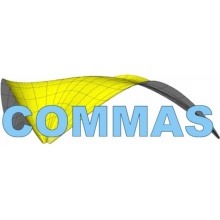Introduction
The Master of Science Program has a regular duration of four semesters. During the first semester, all students take the compulsory modules and courses and concentrate on the fundamentals of mechanics, statics and dynamics, numerical methods, discretization methods and scientific programming.
All modules not only provide an extensive introduction, but also a deep knowledge of the most important areas in the field of Computational Mechanics of Materials and Structures.
During the second and third semesters, electives can be chosen from a large variety of modules. In order to establish an international interaction and to make the students familiar ongoing research areas, further talks on advanced topics of computational mechanics are given in the Summer School by internationally recognized experts.
The fourth semester is dedicated to the Master's Thesis. It is embedded into current scientific activities of the participating research groups. The structure of the program is schematically represented at the end of the text. In this picture LP is the german abbreviation for ECTS credits.
After successful completion of the programme (120 ECTS credits), students are awarded a Master of Science and will be entitled to continue to study towards a doctoral degree without having to meet additional academic requirements. Special Ph.D. programmes in this field are offered at the Universität Stuttgart.
- Continuum Mechanics
- Computational Mechanics of Materials
- Computational Mechanics of Structures
- Discretization Methods and Scientific Programming
- Optimization of Mechanical Systems
- Engineering Materials I
Please visit Overview of Modules page to find the detail description of modules, corresponding lecturers and external links to the module.
- Advanced Numerics of Partial Differential Equations
- Biomechanics
- Behavior and Design of Structures against Natural and Man-made Hazards
- Continuum Biomechanics
- Computational Contact Mechanics
- Computational Dynamics for Robotics
- Computational Methods for Shell Analysis
- Data Processing for Engineers and Scientists
- Dynamics and Control of Legged Locomotion
- Elements of Non-linear Continuum Thermodynamics
- Environmental Fluid Mechanics I
- Environmental Fluid Mechanics II
- Foundation of Continuum Thermodynamics for Single- and Multiphasic Materials
- Fracture Mechanics of Materials in Civil Engineering
- Fuzzy Methods
- Geometrical Methods for Nonlinear Continuum Mechanics and Continuum Thermodynamics
- Implementation and Algorithms for Finite Elements
- Introduction to Model Order Reduction of Mechanical Systems
- Introduction to Nonlinear Continuum Thermodynamics
- Metals and Computational Materials Science
- Micromechanics of Materials and Homogenization Methods
- Micromechanics of Smart and Multifunctional Materials
- Modeling of Connections between Steel and Concrete
- Modeling of Hydrosystems
- Multiscale Models, Methods and Numerics
- Multiphase Modeling
- Non-linear Computational Mechanics of Structures
- Nonlinear Dynamics
- Nonlinear Dynamics of Mechanical Systems
- Nonsmooth Dynamics
- Numerical Methods for Differential Equations
- Numerical Modelling of Soils and Concrete Structures
- Optimal Control
- Seismic Stress of Buildings
- Selected Topics in the Theories of Plasticity and Viscoelasticity
- Theoretical and Computer-Oriented Material Theory
- Variational Methods in Structural Dynamics
- Vehicle Dynamics
- Simulation of Coupled Problems with the Finite Element Methods
- Simulation of Multi-phase and Multi-scale Materials with Homogenization Approaches
- Simulation Methods in Physics 1
- Simulation Methods in Physics 2
Please visit Overview of Modules page to find the detail description of modules, corresponding lecturers and external links to the module.
Summer School
The Summer School contains advanced state of the art topics on continuum mechanics, numerical methods, and engineering materials to be seen as enhancement of the courses in the first and second semester. These topics are given in the summer school by internationally recognized experts.
The students possess a good understanding of current developments in computational mechanics, both in research and industrial application, through the direct interaction with internationally recognized researchers in this field. Through the exposure to the high-level course material, the students are able to make active use of the relevant literature in computational mechanics, which benefits them in their master's thesis work as well as their later professional life.
Seminar Lecture
In connection to one of the modules chosen in the second semester, the students give a seminar lecture on a topic related to that module chosen in agreement with the module coordinator. The students present these lectures in front of a public audience, coinciding mostly with the students attending the same module.
The students are able to plan, prepare and present seminar lectures in an academic environment on previously unfamiliar topics. They know how to set and achive necessary objectives and produce relevant deliverables. To this end the students are able to time-manage their work, use information resources and work in teams.
The Master's Thesis should demonstrate the student's ability to work independently and within a given time-limit on a problem in his field of study according to scientific principles. The candidate will be given the opportunity to suggest a topic. He/she is advised during the preparation of his/her Master's Thesis by a professor and/or a researcher of one of the institutes. The time-limit for completion of the Master's Thesis is limited to six months.
Links for further information about the modules
- List of modules in C@mpus
All the COMMAS modules and modules from other study programs which can be taken by students, and the actual informations about modules can be found here - Overview of the Modules
Information about modules, corresponding lecturers and external links can be found here - Examination Regulations
The examination regulations for the COMMAS program can be found here. As these documents are official documents, they are only in German - Module Handbook
The Module Handbook of the COMMAS program can be download as pdf-file following this link. It contains further information about the modules and their examinations - Institutes and Lecturers
Additional information on some of the associated institutes and lecturers



